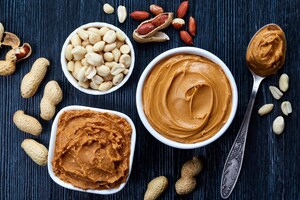
Eating Peanuts Daily Significantly Reduces All-Cause Mortality
ALBANY, Ga., Nov. 21, 2013 /PRNewswire/ -- A major study published in the New England Journal of Medicine, showed that men and women who ate an ounce of peanuts daily reduced their risk of death from all causes by up to 20%. Results also showed that peanut eaters were leaner. This gives people another great reason to get their daily handful of peanuts.
The study, "Association of Nut Consumption with Total and Cause-Specific Mortality," conducted at the Harvard Medical School, is the largest and strongest study to date looking at death from all causes in nut eaters. Researchers tracked almost 119,000 men and women from the Nurses' Health Study and the Health Professionals Follow-up Study for a 30-year period, and used multivariate analysis.
Results showed that the more frequently peanuts were consumed, the lower the risk of death. Compared to non-nut eaters, those who consumed the peanuts less than one time a week reduced risk of death by 7%, weekly eaters reduced risk 11%, eating peanuts two to four times a week cut risk by 13%, and eating peanuts seven or more times a week cut risk by about 20%.
When researchers looked at peanuts alone and compared them to a mixture of tree nuts, they found the results were about the same. "We don't see any difference in the benefits between peanuts and tree nuts," said Dr. Charles Fuchs, who led the Harvard research team.
Previous research from Harvard School of Public Health showed that a 1-ounce serving of peanuts or a half serving (one Tablespoon) of peanut butter five or more times a week, can decrease the risk of diabetes by 27% and 21% respectively. Additional work by Harvard showed that a handful of peanuts eaten five or more times per week can cut the risk of heart disease in half.
Peanuts have more protein than any other nut, are a good source of fiber, vitamin E, folate, phosphorus, thiamin, copper, and magnesium, and an excellent source of niacin and manganese. They are also an extremely high source of phytochemicals. The study explains, "Nutrients in nuts, such as unsaturated fatty acids, high-quality protein, fiber, vitamins (e.g., folate, niacin, and vitamin E), minerals (e.g., potassium, calcium, and magnesium), and phytochemicals (e.g., carotenoids, flavonoids, and phytosterols), may confer cardioprotective, anticarcinogenic, antiinflammatory, and antioxidant properties."
USDA data shows that peanuts are the most frequently consumed nut in the US, with about half of all nuts eaten being peanuts. As America's favorite nut, peanuts offer a unique blend of nutrients that contribute to their beneficial health effects, and shows that a handful a day can do more than offer a delicious and satisfying snack option.
The Peanut Institute is a non-profit organization that supports nutrition research and educational programs that promote healthful lifestyles. For more information about peanuts, peanut butter, peanut flour and peanut oil visit www.peanut-institute.org.
SOURCE The Peanut Institute







Share this article